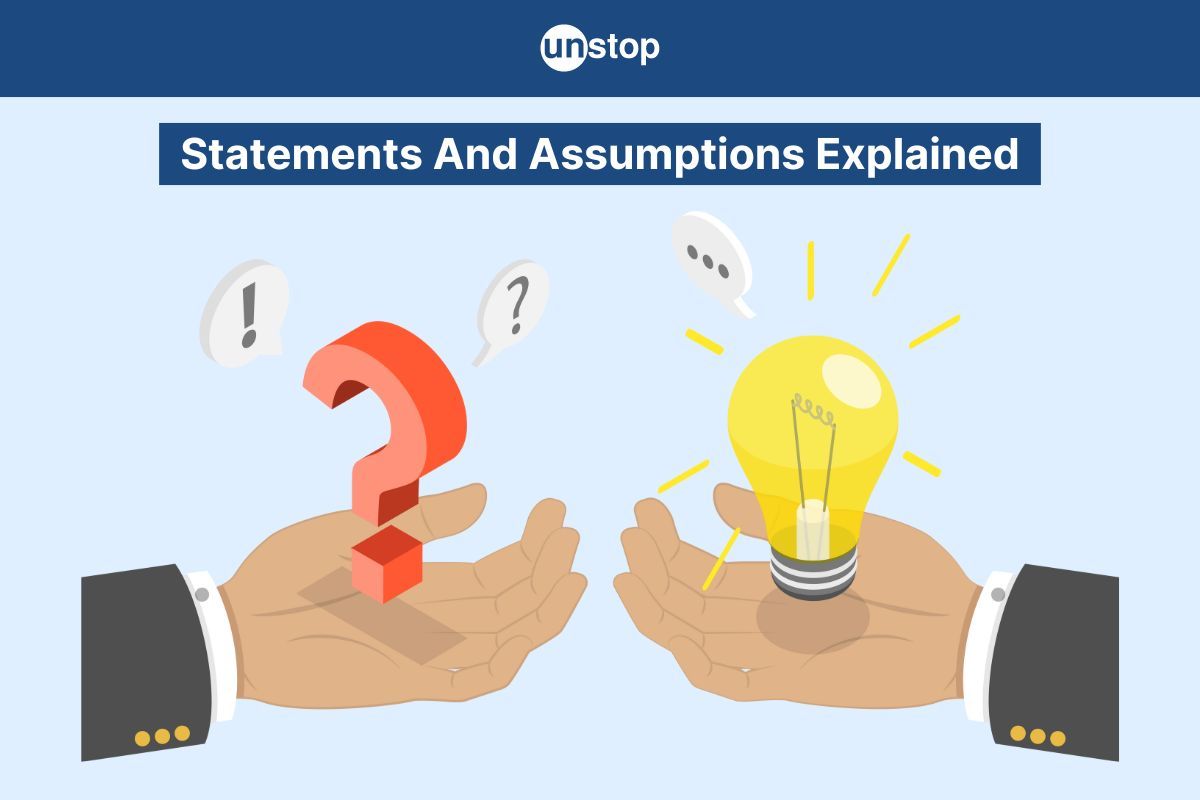- Definition Of Statements And Assumptions
- Key Concepts In Logical Reasoning
- Identifying Statements Vs Assumptions
- Types Of Statement Questions
- Tips To Solve Statements & Assumptions
- Selected Practice Questions And Answers
- Conclusion
- Frequently Asked Questions (FAQs)
Statements And Assumptions- Logical Reasoning Questions & Answers

Delving into logical reasoning for competitive exams and job placement requires a deep understanding of statements and assumptions. Distinguishing between these two elements is crucial for problem-solving and decision-making.
By honing your ability to differentiate statements from assumptions, you can sharpen your cognitive skills and enhance your performance in competitive exams and job interviews.
Definition Of Statements And Assumptions
Statements are facts presented as they are, while assumptions are beliefs taken for granted without proof. In logical reasoning, statements serve as the foundation for arguments.
A statement is a piece of information explicitly given or declared, whereas an assumption is an unstated belief that underlies an argument's logic.
Examples Of Statements & Assumptions
-
A statement: "There are 100 passengers on the train."
-
An assumption: "All passengers have valid tickets."
In this scenario, the number of passengers being 100 is a stated fact (statement), while assuming all passengers have valid tickets involves drawing a conclusion not explicitly mentioned (assumption).

Key Concepts In Logical Reasoning
When tackling logical reasoning questions, a clear grasp of validity, relevance, and inference is essential:
Validity
The accuracy and truthfulness of a statement or argument is known as validity. Making sure that conclusions are supported by strong evidence is essential in logical reasoning questions.
Relevance
Relevance pertains to the significance of information in relation to the question at hand. Understanding relevance helps in filtering out irrelevant details and focusing on what truly matters.
Inference
Inference involves drawing conclusions based on available information. Mastering inference skills enables individuals to make logical deductions and assumptions effectively.
Practice is key to enhancing logical reasoning skills. Regular exercises focus on identifying valid arguments and relevant information and making accurate inferences.
Identifying Statements Vs Assumptions
When tackling logical reasoning questions, focus on factual information presented in the passage. Look for concrete details that can be proven true or false. Identify key phrases like "According to the passage" or "The author states that" to pinpoint statements.
Look for words like "must," "always," or "never" indicating a statement, whereas assumptions often contain terms like "could," "might," or "probably."
Read passages carefully and analyze each sentence to determine if it presents a fact or an assumption. Create a list of statements and assumptions from various texts to reinforce your understanding.
Types Of Statement Questions
Let us study the types of statement questions:
Assertion-Reasoning
Assertion: A statement is provided, and the test-taker must decide if it's true or false.
Reasoning: The test-taker also evaluates whether the reasoning behind the assertion is correct.
For instance, an assertion might claim that "All birds can fly," with reasoning stating that "Birds have wings."
True Or False Statement
Test-takers determine the accuracy of given statements based on facts or logical reasoning. These questions present a statement like "All mammals lay eggs," requiring students to assess its truthfulness. Such questions enhance critical thinking skills by prompting individuals to validate information.
Cause-Effect Statements
A situation or event is presented as the cause. The outcome or result of the cause is identified. In this category, a question might propose that "Increased rainfall leads to crop growth." Students then discern the relationship between the cause (rainfall) and effect (crop growth).
Tips To Solve Statements & Assumptions
Let us study some of the tips to solve statements and assumptions questions effectively:
Identify key information: Start by identifying the core details provided in the statement or question.
Question assumptions: Challenge each piece of information to determine underlying assumptions.
Evaluate logic: Assess the logical coherence of the assumptions with the given context.
Draw conclusions: Based on logical reasoning, draw conclusions that align with the identified assumptions.
Prioritizing keywords: Prioritize identifying keywords in the given text. Focus on words like "not," "all," or "some" to grasp the essence of the statement quickly.
Eliminating extreme options: To enhance accuracy, eliminate extreme options that contain absolute terms like "always" or "never." These choices often lead to incorrect assumptions and can be swiftly discarded.
Selected Practice Questions And Answers
To excel in statement and assumption questions, consistent practice is paramount. Provided below are some of the best-selected practice questions and answers:

Carefully study the statement and the corresponding assumptions and then choose the most appropriate implicit assumption:
Question 1
Statement: A lot of individuals got sick following a wedding party meal and had to be quickly taken to both government and private hospitals in the vicinity.
Assumptions I: Families of those impacted might choose not to bring them to government medical facilities.
Assumption II: The nearby hospitals may be able to attend to all the affected people.
a) Assumption I is implicit.
b) Assumption II is implicit.
c) Either Assumption I or II is implicit.
d) Neither Assumption I nor II is implicit.
e) Both Assumptions I and II are implicit.
Answer: b) Assumption II is implicit.
Explanation: Assumption II is directly related to the statement, which mentions that many people fell ill and were rushed to nearby hospitals. It assumes that these hospitals are equipped to handle the influx of patients.
Question 2
Statement: Your job title is now a programmer. There's a probation period of one year. After that, your performance will be checked for confirmation.
Assumptions I: Typically, we don't know how well someone will do when we hire them.
Assumption II: Generally, an individual tries to prove his worth during probation.
a) Only assumption I is implicit
b) Only assumption II is implicit
c) Either I or II is implicit
d) Neither I nor II is implicit
e) Both I and II are implicit
Answer: e) Both I and II are implicit
Explanation: Both assumptions seem generally reasonable and align with common practices in employment settings.
Question 3
Statement: It is desirable to put the child in school at the age of 5 or so.
Assumption I: When a child reaches that age, they are at the right stage of development to start learning.
Assumption II: The schools do not admit children after six years of age.
a) Only assumption I is implicit
b) Only assumption II is implicit
c) Either I or II is implicit
d) Neither I nor II is implicit
e) Both I and II are implicit
Answer: a) Only assumption I is implicit
Explanation: Assumption I appears reasonable and aligns with developmental and educational principles, while Assumption II seems less likely and may not accurately represent the admission policies of most schools.
Question 4
Statement: "In order to bring punctuality to our office, we must provide a conveyance allowance to our employees," the person in charge of the company tells the Personnel Manager.
Assumption I: Conveyance allowance will not help in bringing punctuality.
Assumption II: Discipline and reward should always go hand in hand.
a) Only assumption I is implicit
b) Only assumption II is implicit
c) Either I or II is implicit
d) Neither I nor II is implicit
e) Both I and II are implicit
Answer: b) Only assumption II is implicit
Question 5
Statement: All Indian youths aged 18 and above should receive unemployment benefits.
Assumption I: There are unemployed youth in India who needs monetary support.
Assumption II: The government has sufficient funds to provide allowance to all unemployed youth.
a) Only assumption I is implicit
b) Only assumption II is implicit
c) Either I or II is implicit
d) Neither I nor II is implicit
e) Both I and II are implicit
Answer: a) Only assumption I is implicit
Question 6
Statement: Warning her child, the mother said, "If you trouble me, I will slap you."
Assumption I: With the warning, the child may stop troubling her.
Assumption II: All children are basically naughty.
a) Only assumption I is implicit
b) Only assumption II is implicit
c) Either I or II is implicit
d) Neither I nor II is implicit
e) Both I and II are implicit
Answer: a) Only assumption I is implicit
Question 7
Statement: In the upcoming fiscal year, there are plans to hire four thousand new primary school teachers by the State government.
Assumption I: There are sufficient schools in the state for four thousand additional primary school teachers.
Assumption II: The eligible candidates may not be interested in applying as the government may not finally appoint such a huge number of primary school teachers.
a) Only assumption I is implicit
b) Only assumption II is implicit
c) Either I or II is implicit
d) Neither I nor II is implicit
e) Both I and II are implicit
Answer: a) Only assumption I is implicit
Question 8
Statement: I wouldn't want to be an engineer if becoming one were effortless.
Assumption I: An individual aspires to be professional.
Assumption II: One desires to achieve a thing that is hard earned.
a) Only assumption I is implicit
b) Only assumption II is implicit
c) Either I or II is implicit
d) Neither I nor II is implicit
e) Both I and II are implicit
Answer: b) Only assumption II is implicit
Question 9
Statement: The concessions on train tickets to hill stations have been removed as they are deemed unnecessary for those who can afford vacations there.
Assumption I: Railways should give concessions only to needy persons.
Assumption II: Railways should not encourage people to spend their holidays at hill stations.
a) Only assumption I is implicit
b) Only assumption II is implicit
c) Either I or II is implicit
d) Neither I nor II is implicit
e) Both I and II are implicit
Answer: a) Only assumption I is implicit
Question 10
Statement: Clothes should be cleaned using detergent.
Assumption I: Detergents form more lather.
Assumption II: Detergents help to dislodge grease and dirt.
a) Only assumption I is implicit
b) Only assumption II is implicit
c) Either I or II is implicit
d) Neither I nor II is implicit
e) Both I and II are implicit
Answer: b) Only assumption II is implicit
Conclusion
You've now grasped the nuances between statements and assumptions, honed your skills in logical reasoning, and delved deep into various question types. By mastering these concepts, you're equipped to approach statement and assumption questions with confidence and precision. Regular practice will solidify your understanding and enhance your problem-solving skills.
Frequently Asked Questions (FAQs)
1. What is the difference between statements and assumptions?
Statements are facts or assertions put forward, while assumptions are beliefs taken for granted without evidence. Understanding this difference is crucial in logical reasoning to differentiate between what is explicitly stated and what is inferred.
2. How can I efficiently identify statements versus assumptions?
To distinguish between statements and assumptions effectively, focus on concrete information presented as statements and underlying beliefs or implications as assumptions. Practice analyzing scenarios to hone your skills in recognizing these distinctions.
3. What are key concepts to grasp in logical reasoning?
Key concepts in logical reasoning include understanding statements, identifying assumptions, analyzing cause-effect relationships, and mastering strategies for solving questions. Familiarize yourself with these concepts to enhance your logical thinking abilities.
4. How can I approach statement questions more efficiently?
When tackling statement questions, focus on the existence of information provided and analyze the context in which it is presented. By honing your skills in identifying relevant details within statements, you can navigate such questions more effectively.
5. What strategies can I use to master statement and assumption concepts?
To excel in understanding statements and assumptions, practice analyzing various scenarios to differentiate between factual statements and implicit assumptions. Develop a systematic approach to dissecting information to enhance your logical reasoning abilities.
Suggested reads:
- Data Interpretation: Definition, Steps, & Practice Questions
- What Is Number In Maths: History, Types, Operations & More
- Ratio and Proportion: Mastering Fundamentals (+ Solved Questions)
- Arithmetic Progression- Notation, Formulas, Questions And Answers
- Geometric Progression- Definition, Formula, Questions & Answers
Instinctively, I fall for nature, music, humor, reading, writing, listening, traveling, observing, learning, unlearning, friendship, exercise, etc., all these from the cradle to the grave- that's ME! It's my irrefutable belief in the uniqueness of all. I'll vehemently defend your right to be your best while I expect the same from you!
Login to continue reading
And access exclusive content, personalized recommendations, and career-boosting opportunities.
Subscribe
to our newsletter














Comments
Add comment